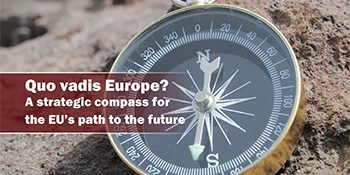Donald Trump’s presidency was characterised first and foremost by his extravagant personality and his populism, but it also wrought a profound change in American politics.
Today, populism is a feature of all democracies and the 46th President-elect, Joe Biden, would do well to cultivate a moderate populism if he is to “restore the soul” of his people, as he put it in his victory speech on 7th November. But Joe Biden will only succeed in unifying his divided nation if he can first unify his divided party and stop it from tearing itself apart in fratricidal feuding.
Internationally, the new President will pursue moderate unilateralism and will start by rolling back the isolationist policies of his predecessor in many areas. There can be no doubt however that the USA will remain the master of its decision making, less provocatively but with continuity and the familiar single-mindedness in implementation.
Biden will also wish to adopt some of the more messianic tendencies within his party, that aim to infuse American foreign policy with democratic and western values, last attempted by George. W. Bush two decades ago. As he seeks to bring a lasting cure to America’s internal divisions, such a stance could help fill the vacuum left by Trump’s ethically objectionable attitude towards despots and dictators.
Around the world, there are expectations of a reset of US foreign policy. Europe has warmly welcomed Biden’s election and hopes for an improvement in transatlantic relations. But how will Europe fit in to the new scheme of things? It must have no illusions that America will want to exert its leadership and that it sees China as its principal adversary. America will press for greater European solidarity on trade with China and on defence and security within NATO. It remains to be seen what attitude Biden will adopt towards Europe’s increased efforts to develop its own defence capabilities within NATO. But he would be well advised to take heed of the French President’s unequivocal statement in his speech of 7th February 2020 that a European defence capability should eventually become a powerful pillar within the NATO Alliance. Europe must be resolute in showing the USA how and to what extent it wishes to shape the future of NATO. There should be no taboos and even NATO’s command structures should be reviewed to fit Europe’s role and importance.
As a primus inter pares, France, as a nuclear power, could take the lead in forging a coalition of European nations of military and geostrategic relevance and discuss, one to one with the USA, the future shape of the transatlantic alliance. For its part, Germany should come off the fence by increasing its defence spending within NATO and the EU.
Whether Joe Biden will have time enough to reconcile the 70 million Trump voters is a question that can only be answered if and when he is able to unite a reformed Democratic party behind his banner.
The President-elect Joe Biden and his Vice President-elect, Kamala Harris, have a monumental task ahead of them: to make the American ship of state seaworthy again, both within and outside their nation. It is not an enviable task.
As President, Joe Biden will face the challenge of being a healer and a reformer at the same time. And the sooner the better, so as to prevent his country from becoming even more divided. A foreign policy success could help him in this task and Europe’s outstretched hand is there to be grasped.
011 322 44 56Monday – Friday 10 AM – 8 PM







